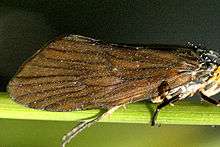Lepidostomatidae
Lepidostomatidae is a family in the order Trichoptera. It is widely dispersed around the world. Larvae shapes vary. Larvae are normally found near bodies of water. It was first discovered by Georg Ulmer in 1903.
| Lepidostomatidae | |
|---|---|
 | |
| Wing detail | |
| Scientific classification | |
| Kingdom: | |
| Phylum: | |
| Class: | |
| Order: | |
| Family: | Lepidostomatidae |
| Subfamilies | |
| |
Distribution
It is normally found in the Northern Hemisphere. Some species' range extends south to Panama and New Guinea.[1]
Larvae
Larvae cases are mostly square shaped or circular. Larvae cases are normally found near rivers or stream beds, although some are found near lake beds.[2]
gollark: GENERALIZING FROM ONE EXAMPLE!
gollark: I believe in the coolness of hexagons, and Satanism but ironically.
gollark: ... well, yes, I don't believe in god(s).
gollark: Yes, I am indeed an Athe worshipper.
gollark: WHAT ARE YOU BASINGTHAT ON
References
- Ulmer, pp. 1–154.
- Weaver, pp. 1–141.
Bibliography
| Wikispecies has information related to Lepidostomatidae |
This article is issued from Wikipedia. The text is licensed under Creative Commons - Attribution - Sharealike. Additional terms may apply for the media files.